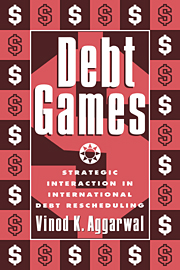Book contents
- Frontmatter
- Contents
- Preface
- Overview
- Part I Argument
- 1 Examining the importance of epochs
- 2 Debt games and play: toward a model of debt rescheduling
- 3 A situational theory of payoffs and intervention decisions
- 4 A theory of situational change
- Part II Epoch I: 1820s–1860s
- Part III Epoch 2: 1860s–1910s
- Part IV Epoch 3: 1910s–1950s
- Part V Epoch 4: 1970s–1990s
- Part VI Implications
- Appendix
- Bibliography
- Index
2 - Debt games and play: toward a model of debt rescheduling
Published online by Cambridge University Press: 02 December 2009
- Frontmatter
- Contents
- Preface
- Overview
- Part I Argument
- 1 Examining the importance of epochs
- 2 Debt games and play: toward a model of debt rescheduling
- 3 A situational theory of payoffs and intervention decisions
- 4 A theory of situational change
- Part II Epoch I: 1820s–1860s
- Part III Epoch 2: 1860s–1910s
- Part IV Epoch 3: 1910s–1950s
- Part V Epoch 4: 1970s–1990s
- Part VI Implications
- Appendix
- Bibliography
- Index
Summary
We have seen how an epochal analysis sheds some light on patterns of debt rescheduling. But given the consistently high variation in the nature and timing of agreements in different epochs, we must move to a less aggregate analysis to predict rescheduling outcomes. This and the subsequent two chapters draw on insights from game theory and theories of political economy to develop a model of bilateral debt negotiations between lenders and debtors, which also allows for possible intervention by creditor governments and international organizations.
Scholars have increasingly turned to game theory to understand strategic interaction among actors. Although this approach has successfully provided insights into many questions in international relations and political economy, it has not been without its detractors. Critics of the use of game theory argue that among other problems, analysts often fail to justify their use of game theoretic approaches, do not make their assumptions clear, and are attracted to technically sophisticated models solely for form's sake at the expense of empirical applicability.
Two additional problems have also tarnished the reputation of the game theoretic approach. First, scholars often simply rework their analysis of an empirical bargaining situation in game theoretic language, failing to provide any additional insight. The basic problem stems from an arbitrary or post-hoc assignment of particular payoff orderings to bargainers. Unless theorists derive utilities from knowledge of actors' characteristics, such efforts simply become misguided attempts to generate sophisticated games that are not empirically applicable. Second, scholars often assume that payoffs remain static.
- Type
- Chapter
- Information
- Debt GamesStrategic Interaction in International Debt Rescheduling, pp. 44 - 60Publisher: Cambridge University PressPrint publication year: 1996



